Everywhere you look, companies are putting more money into artificial intelligence. In fact, over 90% of business leaders say they’ll invest more in it in the next three years. In our opinion, Coursera is a great way to kickstart real AI skills without stepping away from your day job.
With over 100 AI programs on Coursera, choosing the right one can feel paralyzing. You’ve got projects to run, budgets to protect, and leaders asking how soon new skills will pay off. And while course pages promise “4–6 weeks,” the reality is often much longer.
At Aloa, we understand that frustration. And it’s why we share our insights, discoveries, and methods with the community. Our mission is to demystify complex AI concepts and show practical ways to apply them. We can help your team apply their new AI knowledge in a way that bridges the gap between theory and execution.
This guide cuts through the clutter. We’ll lay out Coursera AI certifications side by side: what they cost, how long they take, the recognition they hold, and the skills they deliver. That way, you can pick the program that fits your goals and put what you learn to work right away.
Understanding Coursera's AI Learning Ecosystem
Coursera’s AI ecosystem combines structured content, smart platform tools, and business-focused academies. It helps everyone, from non-technical professionals to advanced engineers, build the AI skills needed to stay relevant in a changing workplace.
Here’s an overview of how the platform structures its AI content:
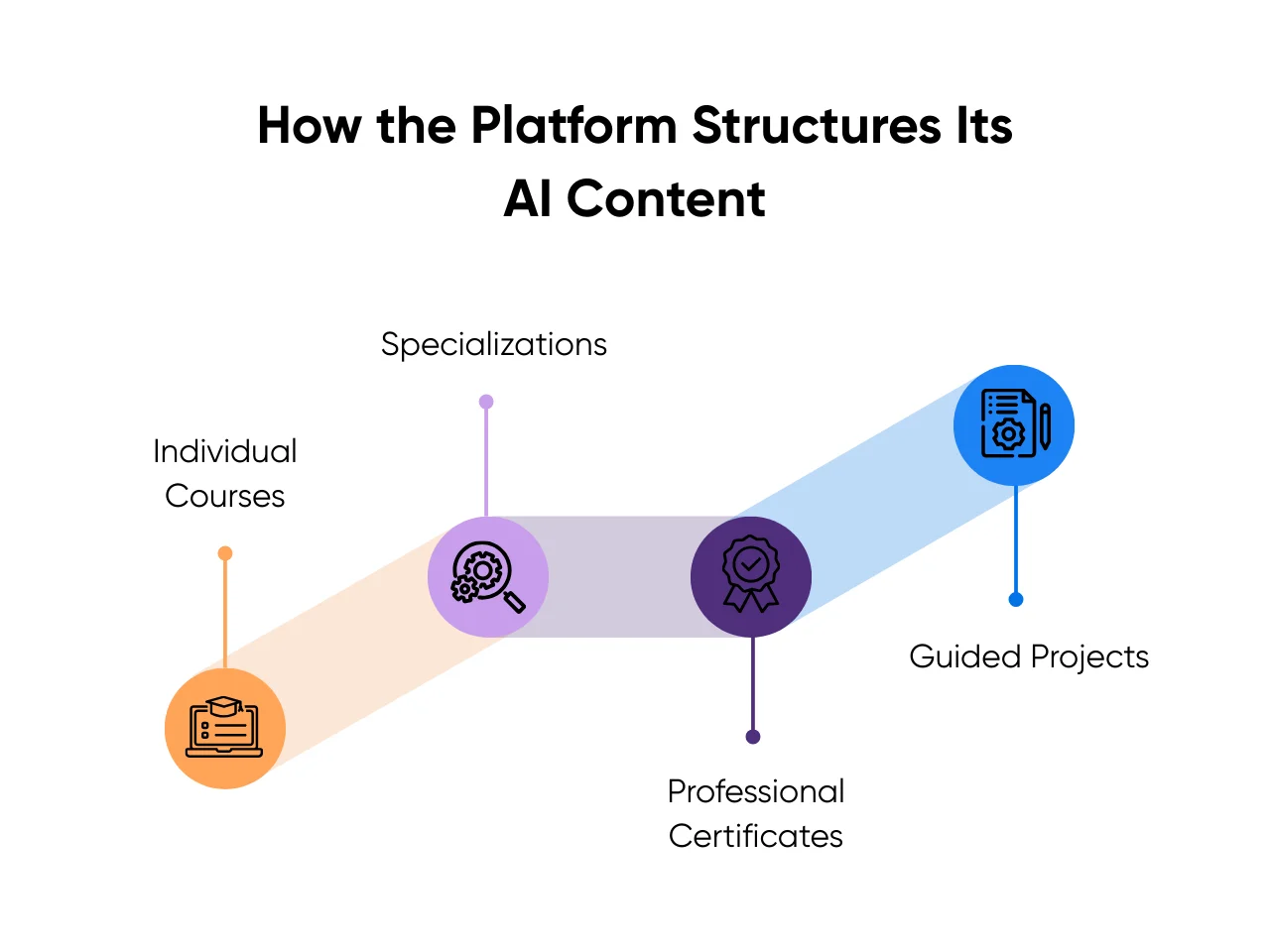
- Individual Courses: Short programs targeting one skill, often completed in four to six weeks.
- Specializations: Multi-course tracks that take three to six months and end with a capstone project.
- Professional Certificates: Job-ready credentials such as IBM’s AI Engineering, running for six to nine months.
- Guided Projects: Two-to-three-hour sessions that deliver quick, hands-on practice.
The source of the credential also makes a difference. University-backed programs like Stanford’s Machine Learning signal academic rigor and carry weight with hiring managers, while industry-led programs from IBM or Google Cloud emphasize workplace tools and practical skills. Many tech managers often choose a blended path: one course to show credibility, another to sharpen applied skills.
Of course, there are other options in the market. DataCamp leans into coding drills, Udemy offers low-cost but inconsistent courses, and edX sticks to university-style rigor. Compared to other platforms, Coursera stands out for balance. It’s great at combining breadth with depth.
One thing, though: the timelines on course pages are optimistic. While some list “4–6 weeks,” most professionals who finish on time commit five to eight hours weekly for three to six months. Dropout rates across online courses can run as high as 60–70%, often because learners underestimate the workload.
To cut through the options, here's a simple path:
- Start with a business-focused course if you’re non-technical and need AI literacy.
- Step into a specialization if you want structured depth and a project portfolio.
- Pursue a professional certificate if your role involves managing or delivering AI projects directly.
Pricing Reality Check
Cost is another factor to weigh in. Before you commit, here’s what the numbers look like on Coursera in 2025:
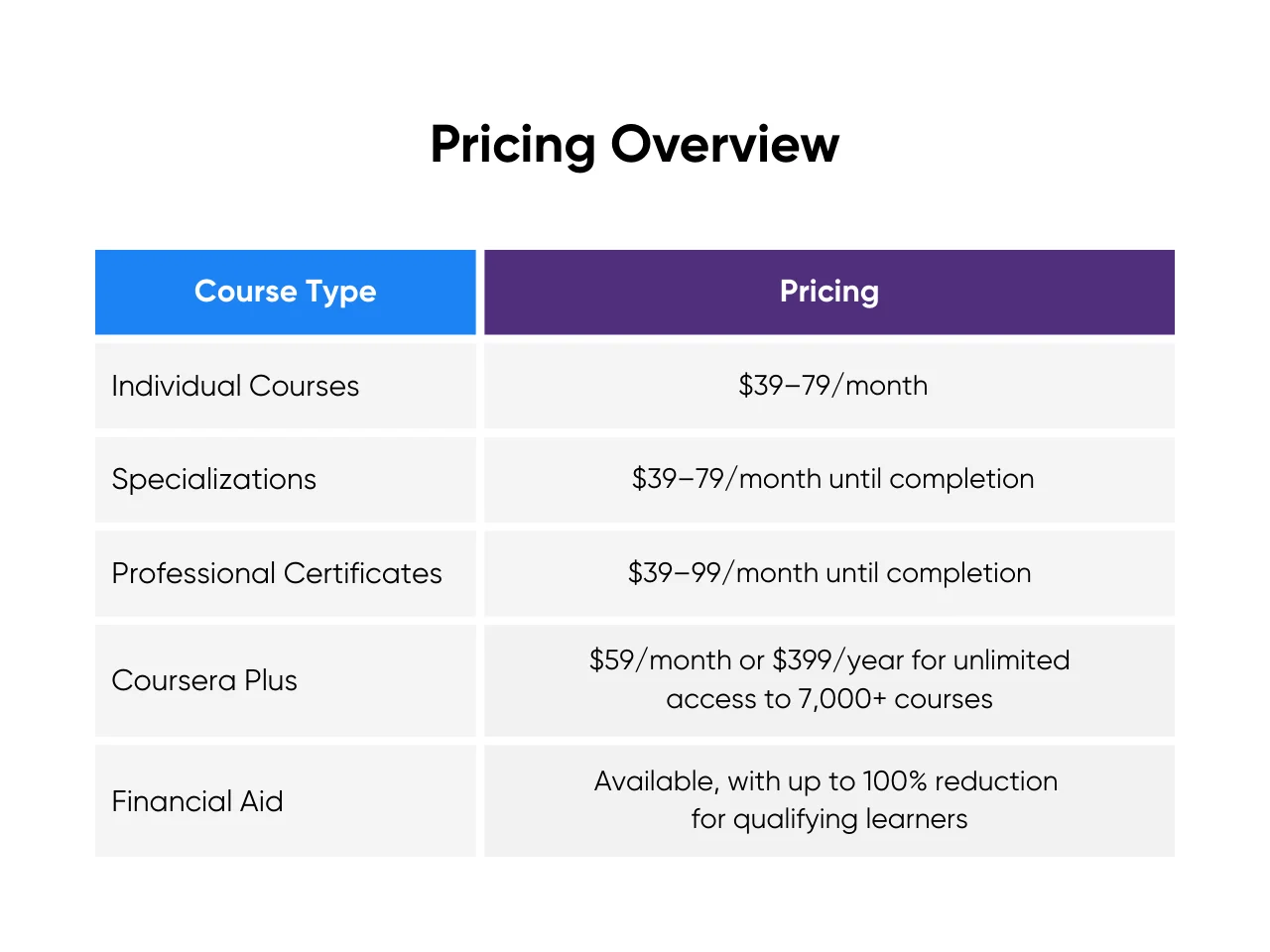
- Individual Courses: $39–79/month
- Specializations: $39–79/month until completion
- Professional Certificates: $39–99/month until completion
- Coursera Plus: $59/month or $399/year for unlimited access to 7,000+ courses
- Financial Aid: Available, with up to 100% reduction for qualifying learners
This makes planning simpler. For a single course, monthly billing works fine. But if you plan to complete two or more certifications in a year, the Plus subscription can pay for itself.
Top-Rated AI Certification Programs
Coursera has more than 100 AI-related programs, but only a handful consistently stand out for quality, credibility, and career impact. These are the ones you can trust to deliver value worth your time and budget. Each program listed here has thousands of learner reviews and strong ratings.
Beginner-Friendly Certifications
If you’re new to AI or come from a non-technical background, these programs can help you build literacy and confidence right off the bat:
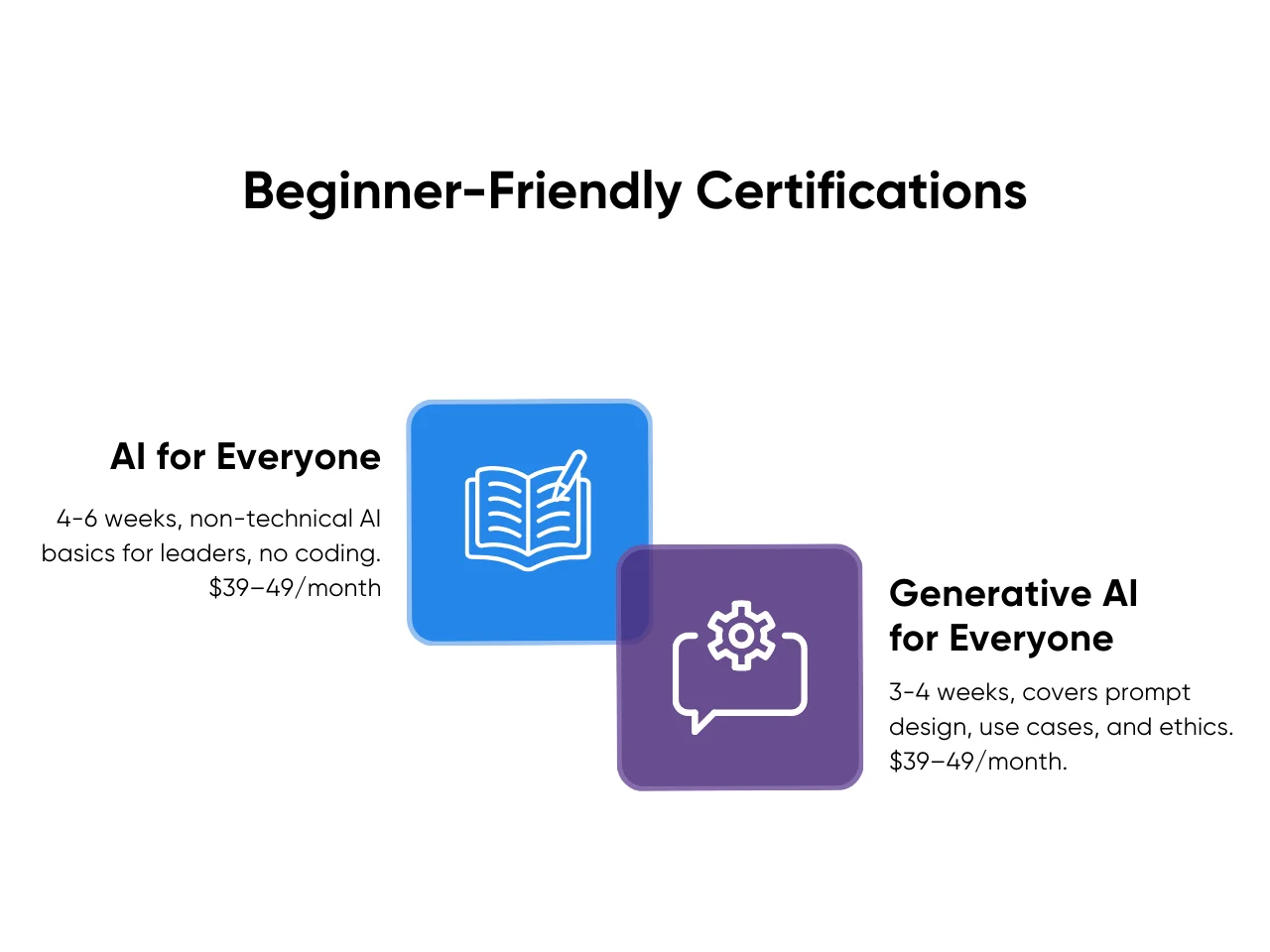
- AI for Everyone (DeepLearning.AI): With a 4.8 rating and nearly 50,000 reviews, this is the go-to program for non-technical leaders. It takes four to six weeks at $39–49/month or is included in Coursera Plus ($59/month). Don’t expect coding, but you’ll leave with the vocabulary and frameworks to evaluate vendors, guide conversations with your engineers, and explain AI’s limits to leadership. This is quite similar to what’s covered in Google AI Essentials.
- Generative AI for Everyone (DeepLearning.AI): A newer course built for the post-ChatGPT workplace. It runs three to four weeks at $39–49/month. It covers prompt design, use cases, and ethical considerations. Many managers use it to pilot small chatbots or automation workflows with their teams.
These programs won’t make you an engineer, but they give you language and tools to lead AI conversations without second-guessing yourself.
Advanced Technical Certifications
For managers who want deeper skills and the ability to oversee technical teams, these certifications build serious credibility:
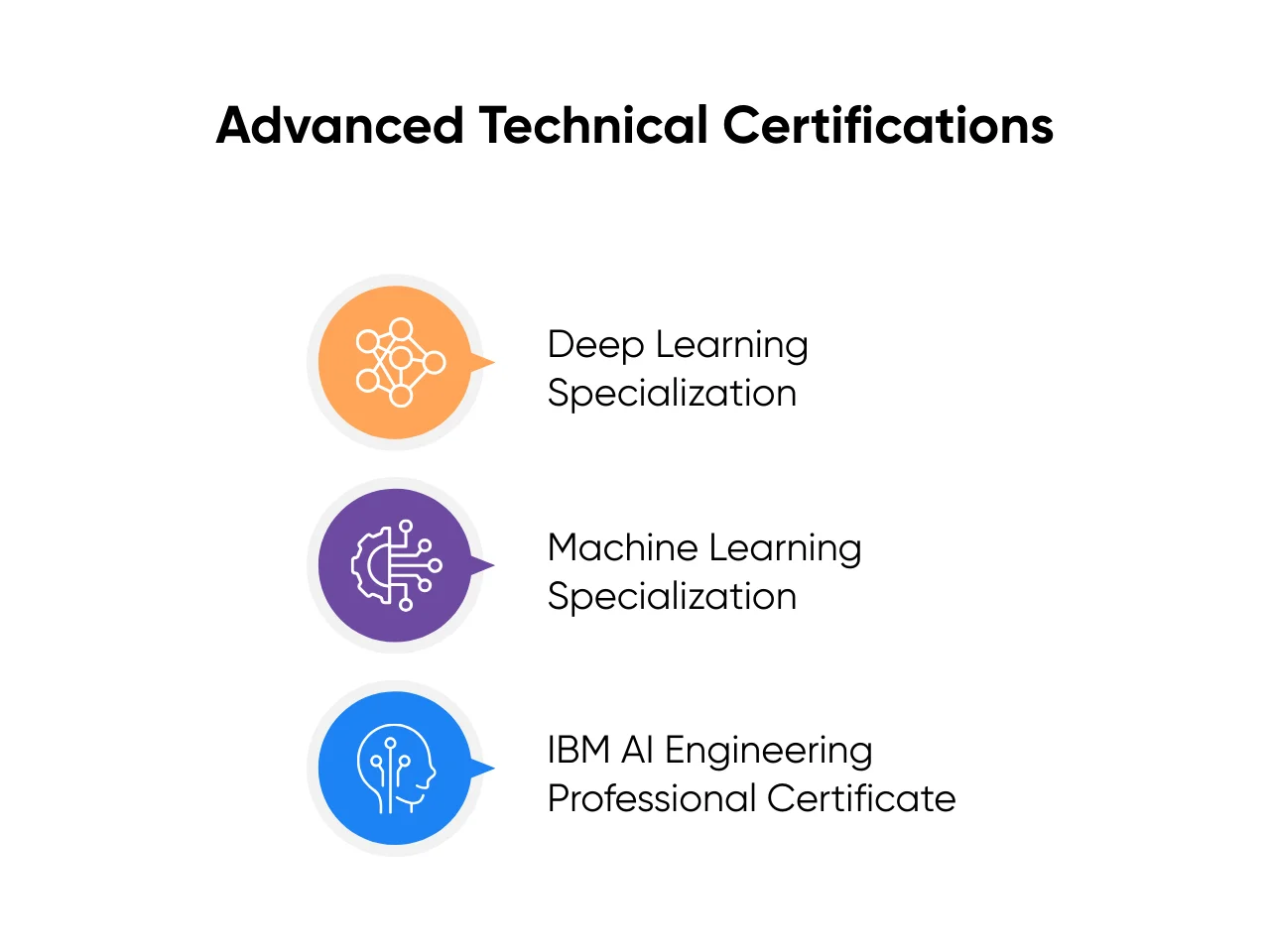
- Deep Learning Specialization (DeepLearning.AI): With 136,000+ reviews and a 4.9 rating, this specialization is a credibility marker for IT leads. Expect three to six months of consistent work at $39–49/month. You’ll build and tune neural networks and work with frameworks like TensorFlow, which helps when scoping vendor work, guiding software development teams, or managing in-house machine learning (ML) pilots.
- Machine Learning Specialization (Stanford/DeepLearning.AI): A 4.9 rating and more than 35,000 reviews back this program. It takes three to four months at $39–49/month and covers core ML methods with Andrew Ng’s instruction. This course is your bridge from understanding models conceptually to setting requirements and evaluation metrics for their teams.
- IBM AI Engineering Professional Certificate: This job-ready credential spans six to nine months and costs $39–79/month. It combines multiple courses covering machine learning, deep learning, and NLP (natural language processing), with training programs structured for long-term learners. While the depth is demanding, the recognition from a major industry brand helps when proving capability in internal promotion or external hiring conversations.
These certifications demand weekly time blocks of five to eight hours. For working professionals, the payoff comes from being able to lead with technical fluency and translate course projects into real proof-of-concept pilots.
Industry-Specific Programs
If your work is tied to a particular sector, these Coursera tracks link AI directly to domain expertise and business value:
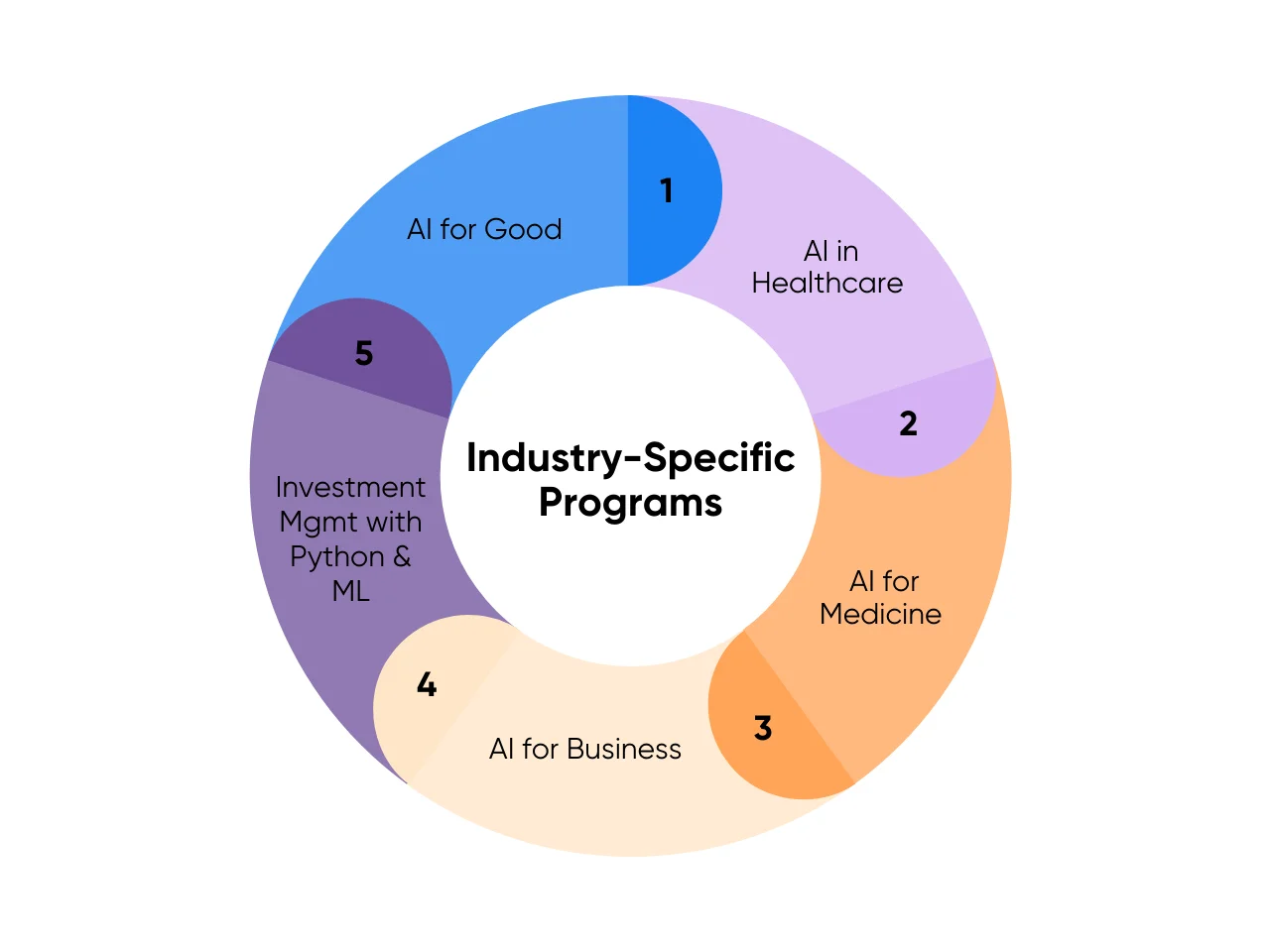
- AI for Good Specialization (DeepLearning.AI + Microsoft AI for Good Lab): With a 4.8 rating, this four-course specialization covers climate change, disaster management, and public health. Expect three to four months of steady study at $39–49/month. Projects include air quality estimation in Bogotá, wind power forecasting, and biodiversity monitoring. Perfect for tech leads who want to build AI literacy while positioning their organizations as leaders in social impact.
- AI in Healthcare Specialization (Stanford University): Rated 4.7 with 2,225 reviews, this four-course series runs about four months at $39–49/month. It focuses on HIPAA compliance, medical imaging, and predictive diagnostics. Healthcare IT managers can use the insights to scope pilots that respect regulatory standards while improving patient outcomes.
- AI for Medicine Specialization (DeepLearning.AI): With a 4.7 rating and 2,213 reviews, this three-course track takes three to four months at $39–49/month. You’ll learn to design systems for diagnosis, prognosis, and treatment recommendations using real medical datasets. The track includes hands-on projects plus ethical and compliance training, so you have practical tools to evaluate and guide clinical AI adoption.
- AI for Business Specialization (University of Pennsylvania - Wharton): This four-course program has a 4.7 rating with 1,467 reviews. Over three to four months at $39–49/month, it covers AI strategy, risk assessment, algorithmic trading, and fraud detection. Business and finance managers can use the frameworks to design AI strategies, align governance with regulations, and prepare stronger investment cases.
- Investment Management with Python and Machine Learning Specialization (EDHEC Business School): A technical four-course track with a 4.5 rating and 1,665 reviews. Expect four to six months at $39–49/month, assuming Python fluency. Topics include portfolio optimization, quantitative modeling, and alternative data for investment decisions. Finance leads with coding background can translate these projects into internal proof-of-concepts for smarter risk and asset management.
When evaluating these programs, focus on how their capstones map to your current priorities. For example, a healthcare manager might use imaging modules to plan diagnostic automation, while a finance manager could apply risk modeling lessons to strengthen internal fraud prevention.
For more curated, business-aligned options, check out AI for business courses, a guide Aloa pulled together to help leaders connect learning paths directly to organizational outcomes.
Practical Skills and Career Benefits
Coursera AI certifications train you in hands-on tasks you can bring straight into the office. You’ll practice cleaning messy CSV files and preparing training data for machine learning models, setting up no-code automation to streamline reporting, and running accuracy checks that flag bias or errors in predictive outputs.
The courses also coach you on writing clear AI project requirements, using tools like Google Cloud’s Skills Boost labs to test prototypes, and framing business cases that tie model performance to savings or revenue gains.
And here’s how those skills translate into the responsibilities you handle every day:
Applying AI Skills to Everyday Work
Here are a few examples of how course takeaways translate into responsibilities and daily tasks you’d handle as an IT Manager, Engineering Lead, Product Owner, or Digital Transformation Director:
- Vendor Evaluation (IT Manager, Procurement Lead): "AI for Everyone" gives you practical terms and frameworks to question inflated claims. For example, when a vendor pitches a chatbot as “self-learning,” you’ll know to ask what training data it uses and how accuracy is measured before making a call.
- Team Leadership (Engineering Manager, Product Owner): The Deep Learning Specialization helps you set specific project targets, like requiring 90% classification accuracy before rollout, so your engineers know you understand the technical and business stakes.
- Strategic Planning (Tech Lead, Business Analyst, Director of Digital Transformation): Wharton’s "AI for Business" specialization uses real-world case studies. You can borrow those models to present proposals that show, in dollars, how automating invoice processing could cut the finance team's workload by 20%.
Career Growth and ROI from AI Certifications
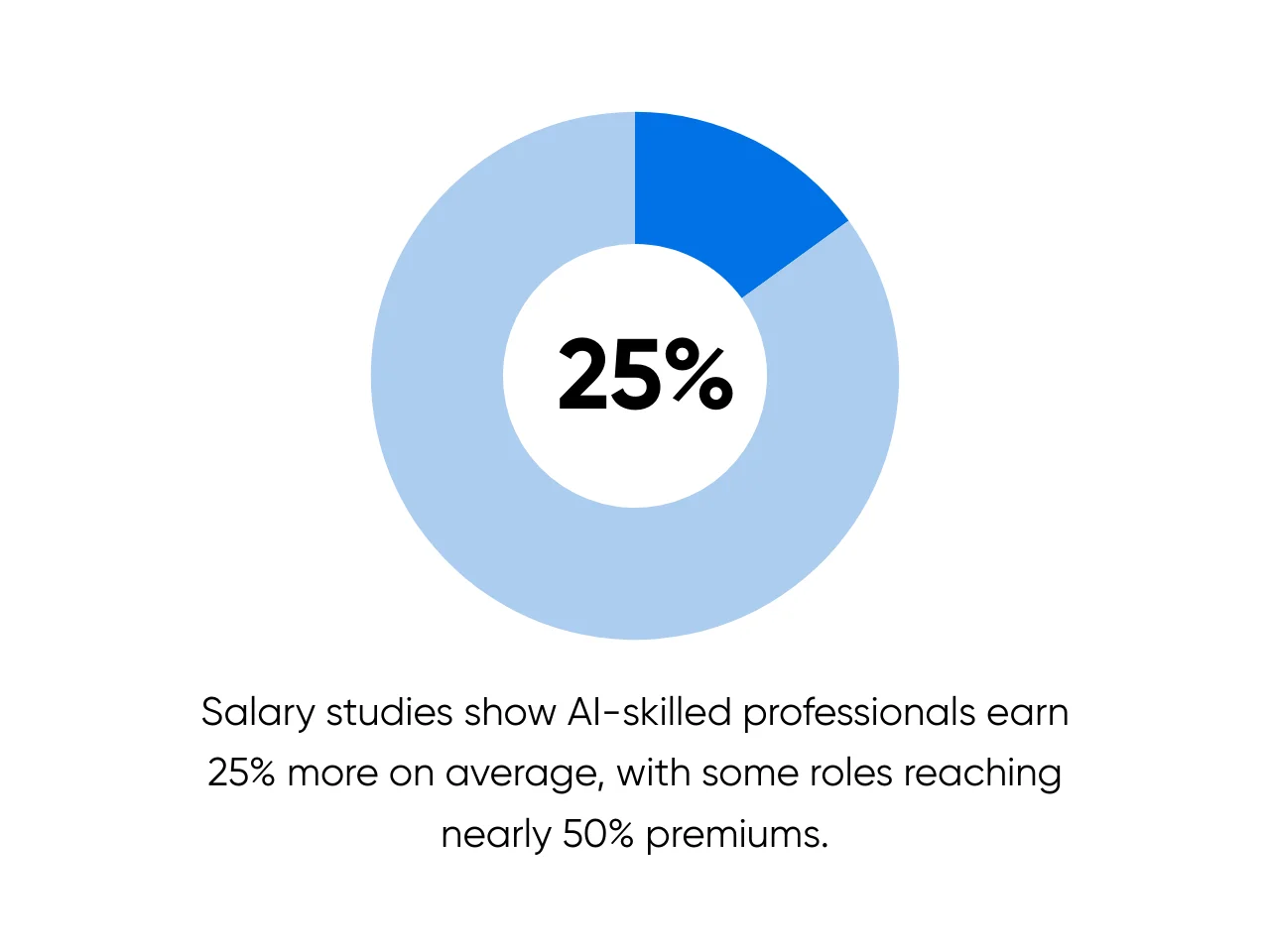
Salary studies show AI-skilled professionals earn 25% more on average, with some roles reaching nearly 50% premiums. For someone making $120,000, that’s around $30,000 in additional annual pay. Beyond numbers, certifications often accelerate promotions by proving you can run pilot projects and contribute to company-wide transformation, not just manage day-to-day delivery. Pairing Coursera AI credentials with Google Cloud certifications can also signal both breadth and technical depth to employers.
Turning Course Projects into Portfolio Proof
Capstone projects and guided exercises can double as portfolio assets. A sentiment analysis notebook from an NLP course can be reframed as a prototype for monitoring customer complaints. A Wharton risk-modeling project can be adapted into a dashboard that simulates your company’s fraud exposure, or connected with Gmail feedback data to track customer satisfaction trends. When you present these as business cases, the conversation shifts from “I took a course” to “Here’s a proof-of-concept you can build on.”
Gaining these skills also changes how you participate in leadership conversations. Instead of observing while technical teams debate, you’re equipped to challenge assumptions, add data-backed input, and steer projects with authority. For more examples of how to shape skills into career assets, see Aloa’s guide to learning AI development.
Learning Strategy and Success Tips
Getting through a Coursera AI certification while running full-time projects takes more than good intentions. Here’s how to finish strong and actually use what you learn:
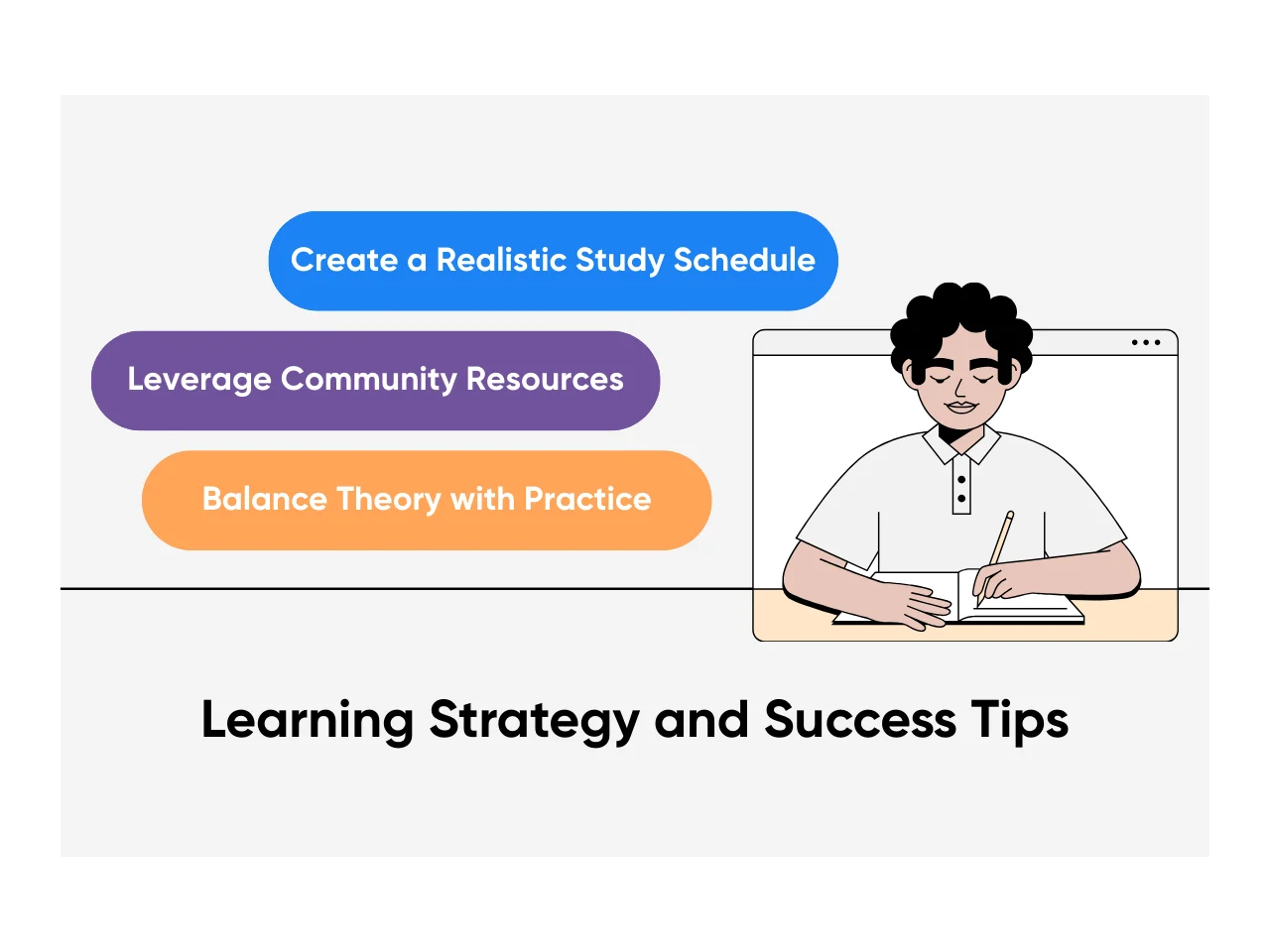
Create a Realistic Study Schedule
Plan for 5–8 hours a week, but break it into clear segments. If you’re studying on your own time, plan for two evening blocks plus a weekend morning to stay consistent. If your company sponsors the certification, talk with your manager about carving out learning hours during the workday so that your team is aware of your focus blocks.
Leverage Community Resources
Coursera forums are places where you can search past posts for coding fixes or drop your own debugging questions. You may be surprised that responses often arrive within 24 hours.
Built specifically for this, Aloa's community is a great place to exchange ideas, test new tools, and share thoughts with others who are learning and experimenting with AI. It can get you answers even quicker, and it feels more like a community than a help desk.
Balance Theory with Practice
Application is the best way to solidify what you’ve learned. Consider AI use cases and map them to your own workflows, such as automating invoice approvals or triaging support tickets.
Midway through "Wharton’s AI for Business," use the ROI templates to critique a vendor’s pitch with actual dollar impact. Post-completion, adapt a capstone project into a small pilot, like using a sentiment model to flag negative NPS survey responses in real time.
Learning doesn’t stop once you’ve wrapped up a certificate. The next challenge is keeping those skills sharp and finding new ways to apply them. Aloa has pulled together a step-by-step guide on how to learn AI that many tech leads use as a reference point while building long-term study habits.
Future-Proofing Your AI Education
AI is moving forward at lightning speed. What’s cutting-edge today could feel dated in 12 months. While Coursera frequently updates existing programs with new modules, Aloa’s newsletter for byte-sized updates keeps you sharp without eating your calendar.
Here are additional emerging areas worth your attention:
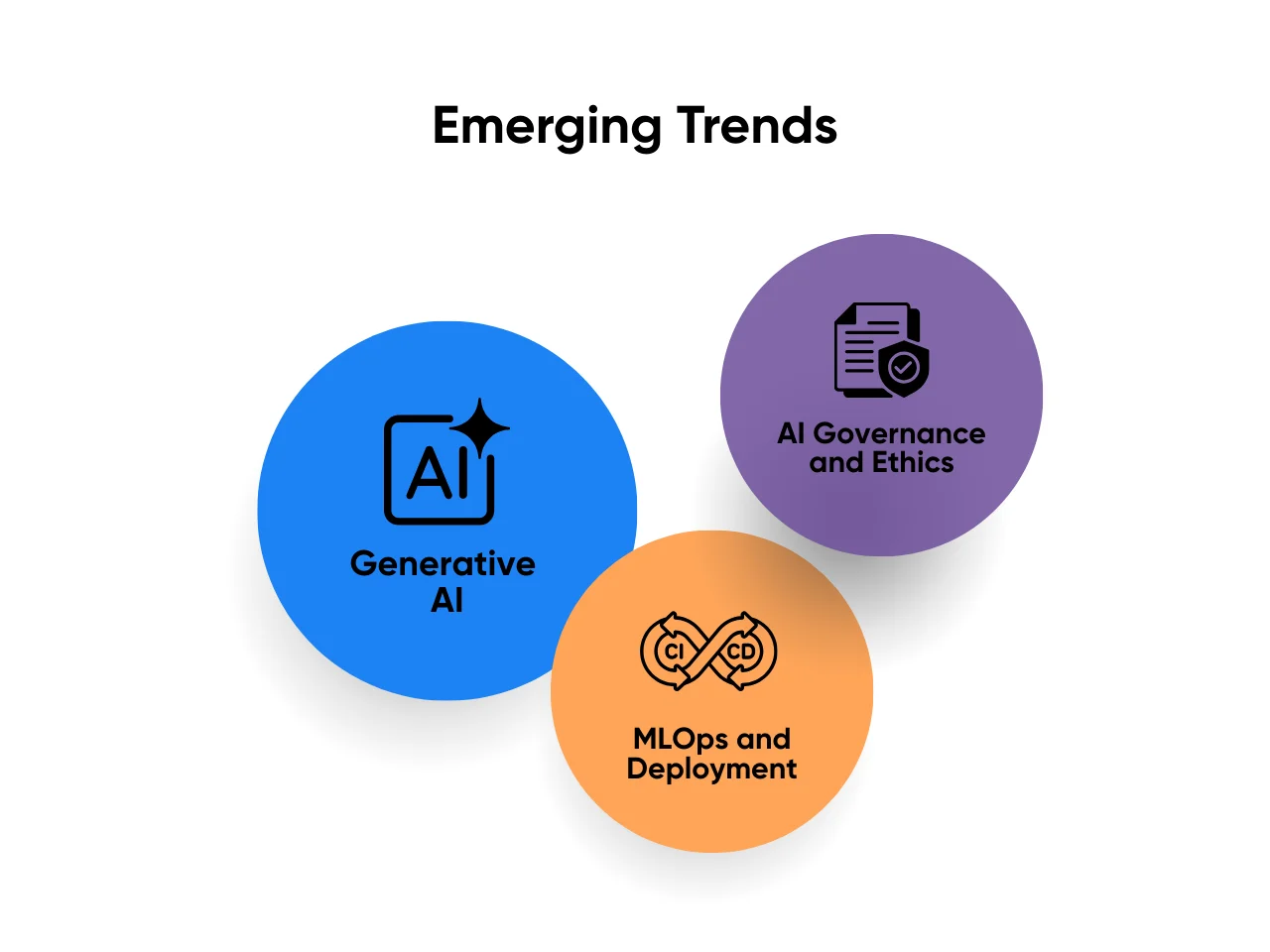
- Generative AI: A year ago, “prompt engineering” wasn’t on anyone’s radar. Now, courses like "Generative AI for Everyone" give you templates for writing effective prompts you can test with large language models (LLMs) such as Vertex or Gemini.
- MLOps and Deployment: Beyond building models, programs are starting to cover monitoring drift and setting up CI/CD pipelines for machine learning, which you’ll need if you’re guiding teams moving prototypes into production.
- AI Governance and Ethics: With regulations heating up in the EU and US, new content helps managers design projects with audit trails and explainability in mind, so you’re not blindsided when compliance teams get involved.
The move here is to treat learning like version control. Start with core skills (machine learning fundamentals or business-focused tracks). Then layer in emerging modules every year as Coursera rolls them out, so your foundation stays solid while you stay current on the next wave.
Key Takeaways
Committing to Coursera AI programs is no small lift. Real progress takes three to six months of steady effort, not the quick wins often promised on course pages. But that investment pays off: you’re almost guaranteed to walk away with a stronger voice in technical discussions, proof-of-concept projects to showcase, and clearer career momentum.
While certifications alone don’t guarantee promotions or salary jumps, what matters is how you use the knowledge. Treat the certificate as the start, not the finish line: apply frameworks to vendor evaluations, bring case-study insights into team planning, and adapt course projects into pilots. That’s when leaders begin to see you as a strategist who can guide transformation.
If you’re weighing next steps, start with one program that fits your current role and time capacity. Plan for five to eight hours a week, layer in community support, and look for ways to put lessons into play at work right away.
For ongoing support, join Aloa’s spaces: our Discord community for peer discussion or our newsletter for “byte-sized” updates. And if you’re ready to connect education with implementation, schedule time with us at Aloa. We’ll help you turn learning into impact.

